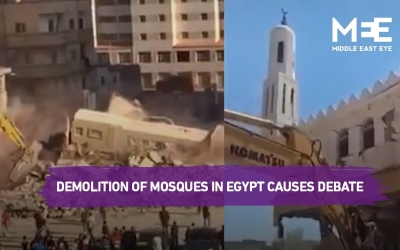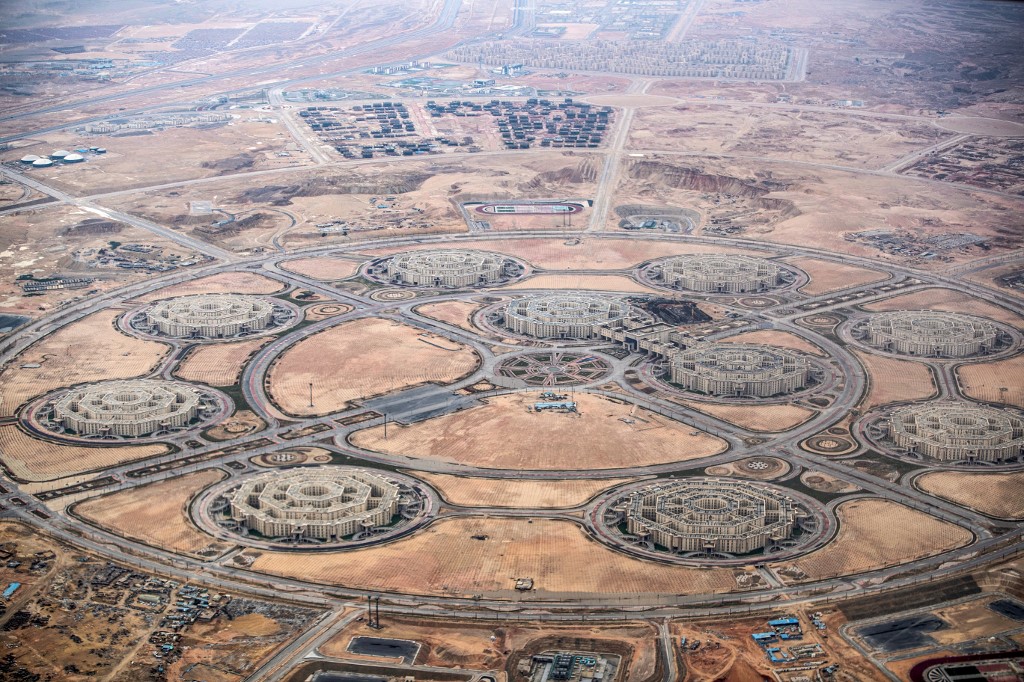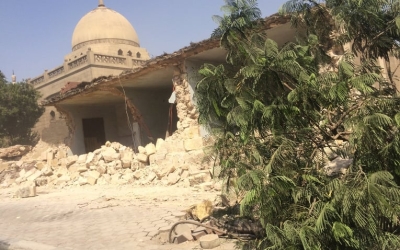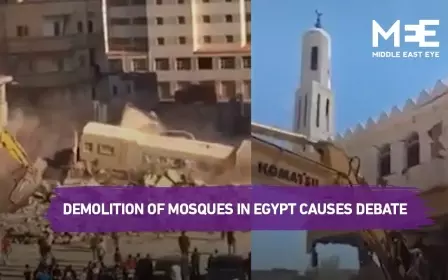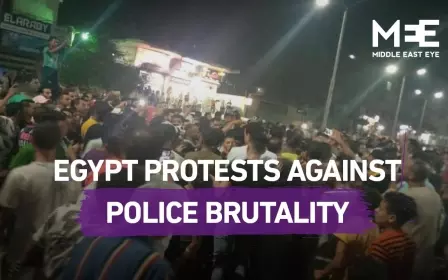Egypt: Thousands at risk of homelessness as state begins mass demolitions
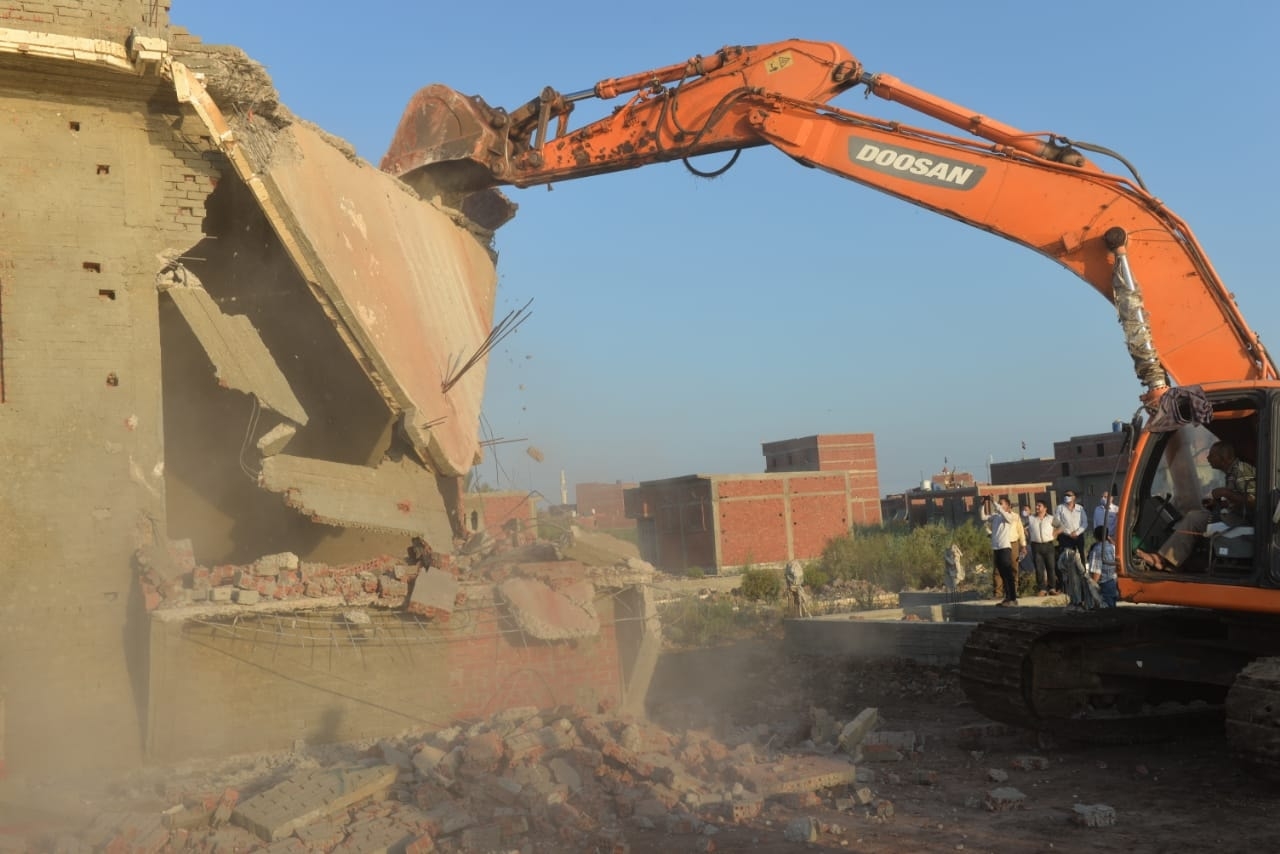
Anger in Egypt continues to rise as state authorities move ahead with the demolition of houses constructed illegally inside cities or on farmland.
The authorities started the campaign late last month, in the largest such action against unlicensed buildings to date.
The campaign has the blessings of President Abdel Fattah al-Sisi who threatened on 29 August to order the army to raze villages constructed illegally, which is eating away at the country's agricultural land and turning it into concrete jungles.
'The government is punishing citizens who are the weakest party to this problem'
- Haitham al-Hariri, Egyptian MP
However, the campaign comes at the cost of tens of thousands of people who are losing their homes, especially with state authorities failing to offer them alternatives.
"I have nowhere to go now," truck driver Mohamed Selim told MEE. "This is a very difficult situation."
New MEE newsletter: Jerusalem Dispatch
Sign up to get the latest insights and analysis on Israel-Palestine, alongside Turkey Unpacked and other MEE newsletters
Selim's house in the eastern Cairo district of Sayeda Zeinab was demolished a few days ago. The authorities say the house was constructed on state land, even as it had been in place for four decades.
He now sleeps in the open together with his four children and wife. Thousands of other Egyptians expect to meet the same fate as state authorities carry the demolition campaign forward.
Construction violations are a huge problem in Egypt, one that has been growing over the years.
Egypt's past administrations turned a blind eye to the violations for decades as they failed to offer ordinary people decent housing.
Between 2000 and 2017, around 2 million construction violations were committed in different parts of Egypt, according to a 2018 report by the Ministry of Local Development.
Egypt has also lost over 12 percent of its nine million acres of farmland to the same violations, amid fears that it could lose all of its farmland if the urban sprawl keeps moving ahead.
The authorities have given violators until 30 September to apply for reconciliation, a process that requires the payment of fines per every square meter of unlicensed construction.
The government says it will tear down violating buildings whose owners do not file for reconciliation before that date.
Egypt makes the construction of houses or other buildings conditional on obtaining construction licences from municipal authorities.
"The government is punishing citizens who are the weakest party to this problem," Haitham al-Hariri, a member of the Committee on Local Administration in the House of Deputies (parliament), told MEE. "It fails to punish executive officials who turned a blind eye to these construction violations for decades."
The demolition campaign has left some villages in total ruins, with serious danger from destroyed buildings.
Call for protests
This anger comes ahead of protests called for by whistle-blower Mohamed Ali, who has asked Egyptians to protest against Sisi on 20 September.
Ali, a construction contractor in self exile since last year, accused Sisi of squandering public funds on the construction of a new capital, luxury palaces and villas, while the majority of Egyptians live in poverty.
He claims to have acquired information about the squandering of public funds within the presidency and the military establishment from years of work with the army in the implementation of army-supervised projects.
Sisi denied Ali's charges, but said he would move ahead with his construction spree in a way that matches Egypt's greatness and regional status.
The Egyptian president is constructing a large number of new cities and a new capital. He is also building dozens of bridges and thousands of kilometres of new roads as well as tens of thousands of flats for slum dwellers.
Nonetheless, Ali succeeded in winning support from most opposition figures in exile and some opposition members and activists inside Egypt.
However, his calls for an anti-Sisi uprising fell flat in September last year when only a few hundred people heeded his calls in a few Egyptian cities.
This time, Ali is asking Egyptians to demonstrate against the demolition of the houses of people in different Egyptian cities.
The success of Ali's calls for protest is far from certain, with expectations that state authorities will take measures to prevent his followers from staging protests.
Nevertheless, the state of anger at the house demolitions is palpable, with Egyptians giving vent to this anger on social media.
'Homeless in a matter of hours'
Housing is a serious issue for Egyptians. For a long time, the country's construction of houses could not keep up with the pace of population growth, around 1.94 percent annually.
For that reason, there has been a chronic shortage houses for the burgeoning population.
Some people spend the prime of their lives toiling to earn enough money to buy a house or construct one. Others have to travel to oil-rich Gulf states and work for years to return home and buy a flat.
Now, these houses are under threat of being pulled down or have already been demolished by government bulldozers, leaving in their wake many heart-rending scenes.
"I had lived in this house for almost 40 years," Selim said. "My children and I became homeless in a matter of hours."
Sisi's administration apparently faces tough choices.
Construction violations have reached crisis levels. They have turned some parts of major cities into sprawling slums leading authorities to start the implementation of an national slum eradication programme that included the transfer of thousands of slum dwellers to public housing developments.
Around 3,200 unorganised housing communities were restablished in the Egyptian countryside in the Nile Valley and the Nile Delta, which include Egypt's most fertile farmland.
The loss of farmland due to the unauthorised construction activities is massive, amounting to hundreds of thousands of acres.
This is why the need for action against these construction violations is seen as very pressing.
The reconciliation process does not apply to buildings established on farmland. It only applies to buildings within the cities that do not suffer engineering or architectural design problems.
However, the fees to be paid by the residents of the violating buildings, the landlords or the contractors, are very high. This has given the impression that state authorities are using the demolition campaign to collect money and compensate for some of the economic losses caused by the coronavirus outbreak.
Alienating government supporters
The issue has also given rise to fears that the government might be antagonising new segments of Egyptian society, including those who were considered among the supporters of the president or among the silent majority.
"The government is trying to eradicate the corruption that has been growing over the years in a matter of a few weeks or months," al-Hariri said. "This is impossible to do and things can get out of control."
So far, anger against the ongoing demolitions is expressed on social media, even as some people are reacting violently to the demolition of their houses.
'States cannot allow their citizens to build whatever they want, wherever they want,'
- Badawi al-Nuweishi MP
Egyptian authorities do not allow peaceful assemblies without permission or licensing in the light of the nation's Protest and Peaceful Assembly Law.
However, the pain of losing one's home is running so deep that the reaction of those losing their homes in the coming period is hard to predict.
The scope of the violations is also very wide. It includes millions of people who have to either pay to stay at home or risk losing it.
Egyptian authorities expect revenues from the reconciliation process to reach billions of Egyptian pounds, with Egyptians queueing outside government offices to pay money for their construction violations.
Nevertheless, those in decision-making circles say the government cannot stay silent while the whole of Egypt is turning into a major slum.
"States cannot allow their citizens to build whatever they want, wherever they want," Badawi al-Nuweishi, another member of the Committee on Local Administration in parliament, told MEE. "If states allow this to happen, the cities will turn into mere slums and all the farmland will be lost."
Middle East Eye delivers independent and unrivalled coverage and analysis of the Middle East, North Africa and beyond. To learn more about republishing this content and the associated fees, please fill out this form. More about MEE can be found here.


